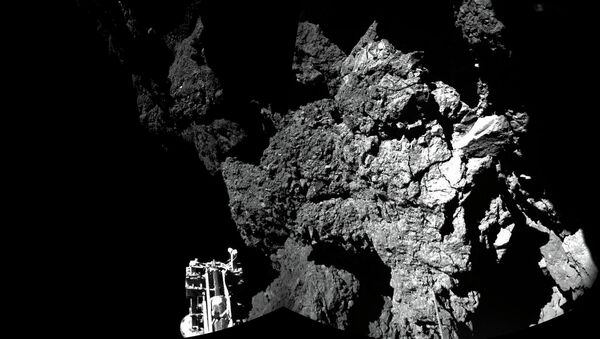MOSCOW, November 15 (Sputnik), Ekaterina Blinova – After landing on 67P/Churyumov–Gerasimenko, the Philae lab robot has begun collecting samples to analyse, however it is feared that the lander may lose power before sending its invaluable data back to Earth. Tonight, scientists will attempt to salvage the mission by moving the probe to a sunnier part of the comet.
"Charged with 60 hours of onboard power, the lander bounced twice after initial touchdown Wednesday, settling at an angle in a crevice in an unknown location, shadowed from sunlight that could potentially have extended its battery life," Agence France-Presse reported.
It is thought that the samples provided from drilling may lead to a scientific breakthrough. Researchers believe that the information obtained from the exploration of the comet could shed light on the formation of the Solar System and the origin of life on Earth. Some experts even suggest that comets could have been responsible for seeding Earth with the "original ingredients for life."
Dramatically, contact between the robot and its orbiting station Rosetta was lost soon after the lander began drilling. "So the mechanism has worked, but unfortunately we have lost the link and we have no more data," noted Philippe Gaudon, an ESA (European Space Agency) project manager, explained during the on-line briefing, as cited by the Associated Press.
Back to work! I’m now drilling into the surface of #67P… I’ll give you updates as soon as I can! #CometLanding
— Philae Lander (@Philae2014) November 14, 2014
Stephan Ulamec, the lander manager, stresses that the robot may lose power before transmitting its results. "Maybe the battery will be empty before we get contact again" [to upload the data, which Philae transmits to Earth via Rosetta] If we don't receive any data it's probably because the battery is flat," he explained according to Agence France-Presse.
Rosetta scientists believe that 80-90 percent of the scientific data will have been harvested, but doubts persist that the information will be uploaded in time.
The robot is equipped with a battery which will keep it alive for 60 hours and was expected to use its backup solar powered batteries which can be recharged by the sun. However, it appears that the robot lab has landed next to a cliff, which is blocking direct sunlight to it. Philae has been getting just 1.5 hours of sunlight instead of the 6-7 hours expected, say researches.
While time is running out for the Philae lander, ESA scientists will make an attempt to "hop the robotic probe into a sunnier spot" on the surface of Comet 67P/Churyumov–Gerasimenko, the Guardian points out, stressing that if their efforts fail, "the lander will go into hibernation" and the "mission will be over." Tonight the researchers will send a command to the lander's legs to move Philae into a "sunnier position," however, there is no guarantee of success, the media outlet warns.
RT @esaoperations: How (and where) is @Philae2014: today’s update from ESOC http://t.co/cdEGa2IjJw #CometLanding pic.twitter.com/4YB2ULY5AP
— ESA Rosetta Mission (@ESA_Rosetta) November 14, 2014
Signals from @Philae2014 are expected at ESOC starting abt 22:30CET — mission team emphasize this time is 'very variable' #CometLanding
— ESA Operations (@esaoperations) November 14, 2014

